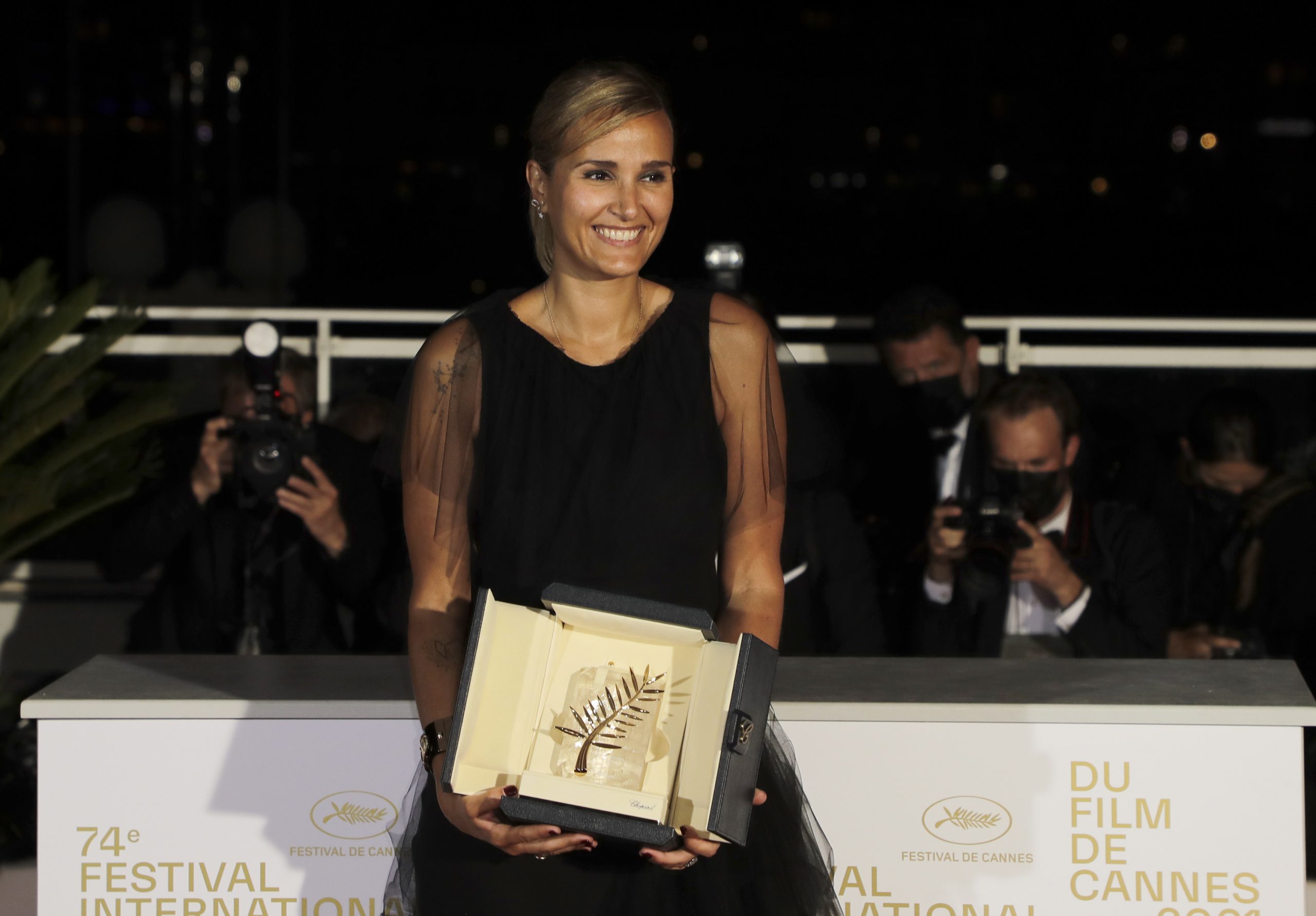Cannes Film Festival: Winners Announced
الإعلان عن جوائز مهرجان كان السينمائي في دورته الـ٧٤
AFP
France’s Julia Ducournau became only the second female director to win a Palme d’Or for her brazen thriller “Titane” as the 74th Cannes Film Festival wrapped up with a bang on Saturday, having successfully pulled off the first full-scale film festival of the Covid era.
If there was ever a doubt that a jury led by Spike Lee would give us a prize list for the history books, it was stamped out with a titanic surprise: a Palme d’Or for one of the most audacious and divisive films to screen in competition in recent years. The manner of Ducournau’s win was equally startling as the ceremony started where it should have ended, with Lee mistakenly announcing the Palme d’Or laureate from the get-go.
A gender-bending, genre-blending, serial-killer oddball that shocked and delighted in equal measure, “Titane” is certainly a bold choice for the most prestigious prize in film. It ends the long wait for a second female laureate since Jane Campion won the Palme d’Or in 1993, for “The Piano”.
“Titane” marks Ducournau’s follow-up to the 2016 shocker “Grave”, the coming-of-age tale of a teenage vegetarian who develops a taste for human flesh. It stars Agathe Rousselle as an accident survivor with a metal plate in her head and a penchant for cars – though not for driving them – who crosses paths with a lonely fire chief in need of emotional healing (played by Vincent Lindon).
The film confirms Ducournau’s status as the leader of an exciting new current in French cinema, blending genre filmmaking and queer concerns. The Hollywood Reporter saw it as dealing “a final stake through the heart” at the “image of French cinema as mainly consisting of artily shot black-and-white movies about straight men smoking and having sex with their mistress(es).”
Ultra-violent scenes had some cinema-goers (this reporter included) shield their eyes. There were plenty of early walkouts at the press screenings, though the film still earned a long standing ovation at its red-carpet premiere. “Titane” is certainly not a movie for all tastes. But if Cannes can no longer take daring, provocative fare, then it might as well close shop.
“This evening has been perfect because it’s been imperfect,” Ducournau said in a nod to Lee’s slip-up. “Thank you for letting the monsters in,” she added, breaking into tears as she finally accepted the prize.
Lee, the first Black jury head in the festival’s history, was seen with his head in his hands as the ceremony awkwardly carried on following his gaffe. He apologised profusely for taking a lot of the suspense out of the evening.
The festival’s other awards were spread out across a slate of films that included many leading international filmmakers. The Grand Prix award was a joint honour split between the Iranian drama “A Hero” and Finnish director Juho Kuosmanen’s “Apartment No. 6”. The third-placed jury prize was also split, between Nadav Lapid’s “Ahed’s Knee”, about censorship in modern Isreal, and Apichatpong Weerasthakul’s meditative “Memoria”.
Best director was awarded to Leos Carax for “Annette,” the fantastical musical that opened the festival. The award was accepted by the musical duo Sparks, who wrote the script and music for the film. Best screenplay went to Ryusuke Hamaguchi’s “Drive My Car,” a Haruki Murakami adaptation he penned with Takamasa Oe.
Norway’s Renate Reinsve took the best actress prize for her stunning turn in Joachim Trier’s much-loved romance “The Worst Person in the World”, while Caleb Landry Jones won best actor for his part in Justin Kurzel’s “Nitram”, about the Port Arthur mass shooting that shook Australia in 1996. The Croatian coming-of-age drama “Murina,” by Antoneta Alamat Kusijanović, took the Camera d’Or award, for best first feature.
Sun, stars and a little drool
The world’s biggest and glitziest film gathering was the first major movie festival to take place in (almost) its usual form since the advent of Covid-19. Pandemic restrictions certainly put a dampener on the parties and resulted in smaller crowds attending, while the unusual July slot meant film buffs were, for once, outnumbered by holidaymakers. Still, the fact that the event was able to take place without major hiccups marked a triumph for Cannes.
There were some complaints early on in the festival about the Covid-19 logistics, which required non-EU attendees (as well as non-vaccinated EU nationals) to take saliva tests every 48 hours. Some were grossed out by all the spitting, but the system was efficient and quick. Pictures of unmasked viewers at early premieres also drew criticism on social media, though restrictions were quickly tightened. French actress Léa Seydoux was the only prominent Covid casualty, missing out on four red-carpet premieres after contracting the virus in Paris.
Seydoux had been due to appear alongside a busload of top stars from Wes Anderson’s “The French Dispatch”, featuring Timothée Chalamet, Tilda Swinton, Bill Murray and many more A-listers. The latter trio of actors posed with the director in the festival’s most meme-able photo, which Twitter users rushed to label. Popular captions included “Z, X, Millennial, Boomer” and “Pitch, first draft, final proof, comments section”.
After last year’s washout, festival goers were treated to an abundance of films, some of which had been waiting to premiere since early 2020. Organisers stacked the 12-day film extravaganza with enough material to ride out the next pandemic, packing 24 movies into the main competition and more than five times the number in its many sidebars – perhaps to make up for the dearth of parties.
The deluge of movies included a brand-new segment on climate change, part of Cannes’ efforts to place the environmental emergency at the heart of its concerns in the Covid era. The famed red carpet was trimmed down this year and made it from recycled materials rather than the usual PVC. Festival organisers also banned plastic bottles, deployed a fleet of electric cars, and instituted a €20 contribution from each attendee to offset some of their carbon footprint.
Aside from the Palme d’Or race, Cannes offered plenty of compelling sights on the big screen. Kira Kovalenko’s “Unclenching the Fists”, about a Russian woman’s attempts to break free from her parents’ grip, picked up the top award in the Un Certain Regard sidebar, dedicated to emerging talent. The segment also featured the festival’s first ever Bangladeshi film with the gripping “Rehana” by Abdullah Mohammad Saad.
Another rarity in Cannes, Haitian cinema got a chance to shine with Gessica Généus’s “Freda”, which brought a measure of joy to a nation in turmoil. “Val”, about the highs and many lows of Val Kilmer’s career, stood out among a flurry of powerful documentaries screened this year, while Cannes scored a late coup with the last-minute inclusion of “Revolution of Our Times”, a hard-hitting chronicle of Hong Kong’s pro-democracy protests in 2019 and their brutal suppression.
قنا
باريس: أعلنت يوم الأمس في فرنسا، جوائز /مهرجان كان السينمائي/، أكبر مهرجانات السينما في العالم، الذي يعود في دورته الـ74 بعد توقفها عام 2020 بسبب جائحة فيروس كورونا /كوفيد – 19/.
فقد حصل فيلم /تيتان/ للمخرجة الفرنسية جوليا دوكورنو على جائزة /السعفة الذهبية/، ما يجعلها ثاني مخرجة تفوز بأرفع جائزة في المهرجان منذ تاريخه الممتد.
كما نال فيلما /إيه هيرو/ للمخرج الإيراني أصغر فرهادي و/هيتي نمبر 6/ للمخرج الفنلندي يوهو كووسمانن، /الجائزة الكبرى/.
أما /جائزة لجنة التحكيم/ فقد حصل عليها فيلما /الركبة/ للمخرج ناداف لبيد من الكيان الإسرائيلي، و/ميموريا/ للمخرج التايلاندي أبيشاتونغ ويراسيتاكول.
وحصل المخرج الفرنسي ليوس كاراكس على /جائزة أفضل إخراج/ عن فيلمه /أنيت/، فيما نال الأمريكي كاليب لاندري جونز /جائزة أفضل ممثل/ عن فيلمه /نيترام/.
أما النروجية رينات رينسفي فانتزعت /جائزة أفضل ممثلة/ عن فيلمها /ذي وورست برسن إن ذي وورلد/، بينما حصد المخرج الياباني ريوسوكي هاماغوشي، /جائزة أفضل سيناريو/ عن فيلمه /درايف ماي كار/.
كما ذهبت /جائزة الكاميرا الذهبية/ إلى المخرجة الكرواتية أنتونيتا ألامات كوسيانوفيتش عن فيلمها /مورينا/، و/جائزة السعفة الذهبية لأفضل فيلم قصير/ إلى المخرجة تانغ يي من /هونغ كونغ/ عن فيلمها /تيان شيا وو يا/.
وكان /التنويه الخاص لأفضل فيلم قصير/ من نصيب المخرجة البرازيلية جاسمن تينوتشي عن فيلمها /أوغست سكاي/.




